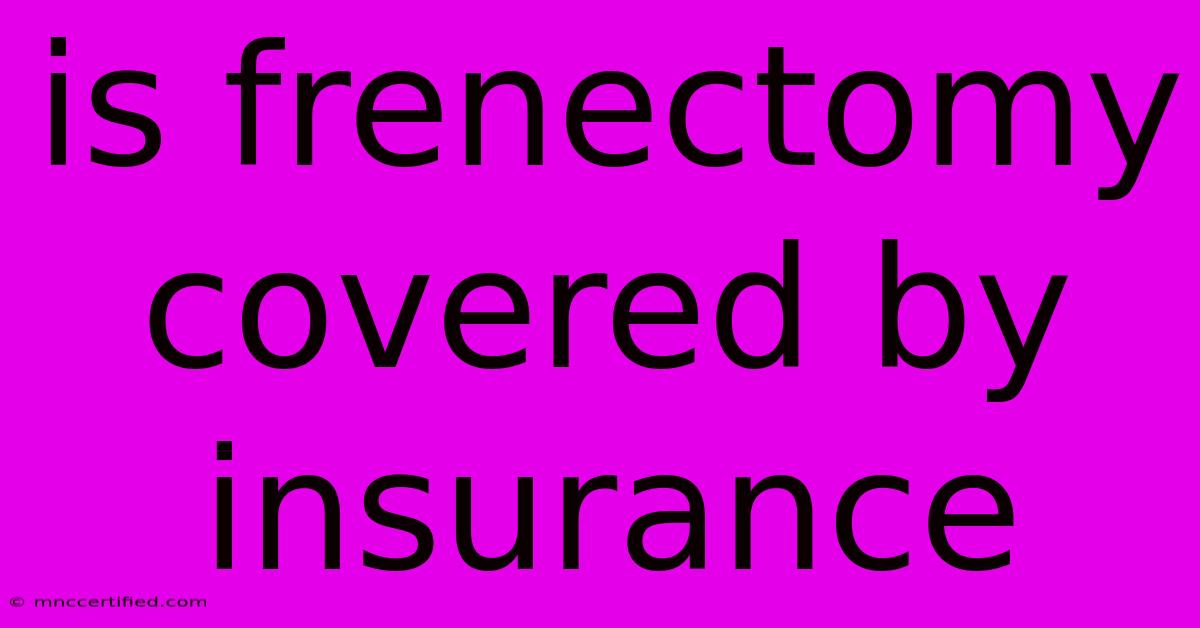Is Frenectomy Covered By Insurance

Table of Contents
Is Frenectomy Covered by Insurance? A Comprehensive Guide
The cost of a frenectomy, a surgical procedure to remove a frenulum (a small fold of tissue), can be a significant concern for many parents and individuals. Understanding your insurance coverage is crucial before proceeding. This article will delve into the intricacies of insurance coverage for frenectomies, addressing various factors that influence reimbursement.
What is a Frenectomy?
A frenectomy is a relatively minor surgical procedure that involves removing a frenulum, a thin membrane of tissue. The most common types are lingual frenectomies (affecting the tongue) and labial frenectomies (affecting the lip). These procedures are often performed to address issues like:
- Tongue-tie (ankyloglossia): A short or tight lingual frenulum that restricts tongue movement.
- Lip-tie: A short or tight labial frenulum that can affect breastfeeding, speech, or gum health.
Insurance Coverage: The Variables
Whether your insurance covers a frenectomy depends on several key factors:
1. Your Insurance Plan:
- Type of Plan: PPOs (Preferred Provider Organizations) generally offer broader coverage than HMOs (Health Maintenance Organizations). Depending on your specific plan, a frenectomy might be considered a medically necessary procedure, leading to better coverage.
- Specific Benefits: Carefully review your insurance policy's details, focusing on sections related to surgical procedures, oral surgery, and potentially pediatric care (if applicable). Look for terms like "medically necessary," "covered services," and "pre-authorization."
- Deductible and Copay: Even with coverage, you'll likely face a deductible and copay. Understanding these costs beforehand is crucial for budgeting.
2. Medical Necessity:
This is the most critical factor. Insurance companies typically only cover procedures deemed medically necessary. A simple cosmetic frenectomy is less likely to be covered than one addressing a significant functional impairment. Your doctor needs to clearly demonstrate a medical necessity, such as:
- Difficulty breastfeeding (for infants): A lip-tie severely impacting feeding can justify coverage.
- Speech impediments: A tongue-tie hindering speech development can increase the likelihood of coverage.
- Gum recession or periodontal disease: A frenulum contributing to gum problems can strengthen the medical necessity argument.
3. Provider Network:
Using an in-network provider is generally recommended. This means the surgeon is part of your insurance company's network, often resulting in lower out-of-pocket costs. Choosing an out-of-network provider can lead to significantly higher expenses.
4. Pre-Authorization:
Many insurance companies require pre-authorization for procedures like frenectomies. This means your doctor must obtain approval from your insurance company before the surgery. Failure to obtain pre-authorization might result in denied claims.
Steps to Maximize Your Chances of Coverage:
-
Contact your insurance provider directly: Discuss the procedure with your insurance company before scheduling the surgery. Obtain a detailed explanation of your coverage, including deductibles, copays, and any pre-authorization requirements.
-
Choose an in-network provider: This will help minimize costs and streamline the claims process.
-
Obtain detailed medical documentation: Your doctor should provide comprehensive documentation outlining the medical necessity of the procedure. This documentation should clearly explain how the frenulum is impacting your or your child's health.
-
Follow all pre-authorization procedures: If pre-authorization is required, ensure your doctor completes this step meticulously.
-
Appeal denied claims: If your claim is denied, understand your options for appealing the decision. The insurance company should have a clear appeals process outlined in your policy documents.
Conclusion:
While insurance coverage for frenectomies isn't guaranteed, understanding the factors influencing coverage and taking proactive steps significantly improves your chances of minimizing out-of-pocket expenses. Always communicate openly with your doctor and insurance provider to ensure a smooth process. Remember that proper documentation emphasizing the medical necessity of the procedure is paramount to successful claim processing.

Thank you for visiting our website wich cover about Is Frenectomy Covered By Insurance. We hope the information provided has been useful to you. Feel free to contact us if you have any questions or need further assistance. See you next time and dont miss to bookmark.
Featured Posts
-
Does Oliver Peoples Take Insurance
Nov 16, 2024
-
Cobra Kai Season 6 Part 3 Release
Nov 16, 2024
-
49ers Bills Game Thrive City Watch Party
Nov 16, 2024
-
Trump Gains Support Sylvester Stallone Weighs In
Nov 16, 2024
-
Portugal Vs Poland Live Match Updates
Nov 16, 2024